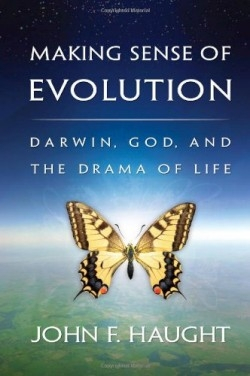It looks like you've stumbled upon a page meant to be read by our code instead of viewed directly. You're probably looking for this page.
Making Sense of Evolution
Darwin God and the Drama of Life
Darwin is not the mortal enemy of theologians everywhere; evolutionary theory actually enriches and enlivens modern Christian theology. This is John F. Haught’s thought-provoking thesis in Making Sense of Evolution.
Most contemporary discussions of theology and evolution have been reduced to arguments between neo-atheists, “led” by Richard Dawkins, and proponents of intelligent design. Haught takes both groups to task for being obsessed with design. As far as he’s concerned, both groups are missing the point entirely.
Haught himself is Senior Fellow of Science and Religion at the Woodstock Theological Center and professor emeritus of theology at Georgetown University. His previous works include God and the New Atheism: A Critical Response to Dawkins, Harris, and Hitchens.
Through a series of alliterative chapters (Darwin, Design, Drama, Direction, Deity, and so on), Haught attempts to open up a dialogue between Darwin and modern Christian theology. The very fact that he is attempting to reconcile them instead of using one to refute the other is a refreshing change of pace.
To achieve his end, he focuses on the premise that “our experience can be explained at multiple levels of understanding, in distinct and noncompeting ways”—what he refers to as layered explanation. Let science handle natural phenomena and let theology look at questions of meaning, purpose, and direction. In this respect he somewhat mimics Stephen J. Gould’s arrangement of “non-overlapping magisteria” for science and religion. The potent metaphor of words on a page illustrates his point. Chemistry (science) can tell us how the ink bonds to the paper to form the letters, but only language (theology) can allow us to decipher the meaning. Both layers of understanding are true, and neither need conflict with the other.
Many readers—especially skeptical ones—will find this book challenging. That’s a good thing. Regardless of where readers fall on the belief/non-belief spectrum, they will find something in Haught’s argument that will sharpen and better shape their own perspective.
Haught’s logic is well thought out, and his core argument is strong, but his prose can be a bit heavy-handed and repetitive. He also devotes more time to specifically naming and refuting Dawkins and other neo-atheists than seems strictly necessary for an ostensibly academic, objective book. Nevertheless, Making Sense of Evolution will appeal to anybody with an interest in the roles of science and religion in the modern world. Just as Haught argues that Darwin simultaneously challenges and enriches theology, Haught’s book challenges and enriches the contemporary discourse between science and religion.
Disclosure: This article is not an endorsement, but a review. The publisher of this book provided free copies of the book to have their book reviewed by a professional reviewer. No fee was paid by the publisher for this review. Foreword Reviews only recommends books that we love. Foreword Magazine, Inc. is disclosing this in accordance with the Federal Trade Commission’s 16 CFR, Part 255.
